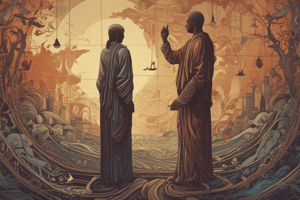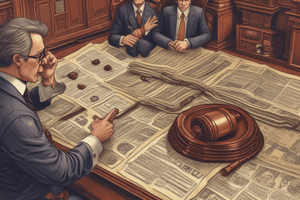Podcast
Questions and Answers
What is the significance of discretion in the field of criminal justice, and how does it relate to the importance of ethics?
What is the significance of discretion in the field of criminal justice, and how does it relate to the importance of ethics?
Discretion allows professionals to make decisions between choices, highlighting the need for strong ethics to ensure fair and just outcomes.
How does the power of legislators to define and criminalize certain behaviors impact individual liberties and societal norms?
How does the power of legislators to define and criminalize certain behaviors impact individual liberties and societal norms?
Legislators can impact individual liberties and societal norms by determining what is considered illegal and punishable, influencing how people live and interact.
In what ways can the ethical conduct of legislators, particularly concerning discretion, affect public perception and trust in the legal system?
In what ways can the ethical conduct of legislators, particularly concerning discretion, affect public perception and trust in the legal system?
If legislators are perceived to be influenced by personal interests rather than public good, it can erode public trust.
How does the power of police officers to enforce laws and make discretionary decisions impact individual rights, and what ethical considerations should guide their actions?
How does the power of police officers to enforce laws and make discretionary decisions impact individual rights, and what ethical considerations should guide their actions?
What is the ethical responsibility of prosecutors in the criminal justice system beyond simply securing convictions?
What is the ethical responsibility of prosecutors in the criminal justice system beyond simply securing convictions?
How do the decisions of judges, especially at the Supreme Court level, impact social disputes and individual rights, and why does this make their nomination and appointment a matter of significant public and political interest?
How do the decisions of judges, especially at the Supreme Court level, impact social disputes and individual rights, and why does this make their nomination and appointment a matter of significant public and political interest?
What ethical considerations should guide correctional officials in making decisions that affect the lives and liberty of individuals under their supervision?
What ethical considerations should guide correctional officials in making decisions that affect the lives and liberty of individuals under their supervision?
Identify and briefly explain three common elements shared by professionals in the criminal justice system despite the different dilemmas they face?
Identify and briefly explain three common elements shared by professionals in the criminal justice system despite the different dilemmas they face?
How does acting as a public servant place an additional ethical burden on criminal justice professionals?
How does acting as a public servant place an additional ethical burden on criminal justice professionals?
What are the potential consequences for criminal justice professionals who disregard ethics in their actions and decisions?
What are the potential consequences for criminal justice professionals who disregard ethics in their actions and decisions?
Flashcards
Discretion
Discretion
The authority to make a decision between two or more choices.
Duty of Enforcement
Duty of Enforcement
Professionals in criminal justice have a fundamental obligation to uphold and enforce all laws.
Due Process
Due Process
Safeguards ensuring protection from governmental deprivation of life, liberty, or property.
Public Servants
Public Servants
Signup and view all the flashcards
Emoluments Clause
Emoluments Clause
Signup and view all the flashcards
Ethics and Coercion
Ethics and Coercion
Signup and view all the flashcards
Public/Client Ethical Concerns
Public/Client Ethical Concerns
Signup and view all the flashcards
Agency/Organization Ethical Concerns
Agency/Organization Ethical Concerns
Signup and view all the flashcards
Peers/Coworkers Ethical Concerns
Peers/Coworkers Ethical Concerns
Signup and view all the flashcards
Study Notes
- Professionals in the criminal justice system have varying roles but share the common traits of discretion, authority, and power.
- The greater the role discretion plays in a profession, the more critical it is to have a strong ethical foundation.
- Legislators can define illegal acts and punishments, often citing public safety or moral reasons, but must respect constitutional limits.
- Legislators' decisions to criminalize behaviors and judges' assessments of lawfulness are covered in Chapters 3 and 8.
- Legislators may be perceived as unethically swayed by lobbyists and personal interests.
- Jack Abramoff, a former lobbyist, was imprisoned for bribing legislators; in 2020, he was charged with violating a law amended due to his actions.
- Police are granted discretionary power through laws and can issue warnings for offenses like traffic tickets.
- Police can deprive individuals of their freedom via arrest, decide whom to investigate, and determine when force is warranted, a power subject to scrutiny.
- Chapters 5, 6, and 7 explore using discretion ethically by law enforcement.
- Prosecutors have significant but often unseen discretion in deciding whom and how to prosecute, including charge selection, grand jury referrals, and seeking the death penalty.
- Prosecutors should pursue justice and not be influenced by politics.
- Defense attorneys have ethical duties to their clients and also obligations as officers of the court.
- Defense attorneys decide whether to take a case, advise clients on plea deals, determine the use of evidence, and suggest appeals.
- Judges wield significant power in accepting plea bargains, ruling on evidence, and sentencing, with the Supreme Court holding the most power.
- The Supreme Court resolves legality questions, even without social consensus, such as in Obergefell v. Hodges (2015), which legalized same-sex marriage nationwide.
- The power to nominate and appoint Supreme Court Justices is highly politicized due to their influence on social issues.
- Chapters 8, 9, and 10 addresses ethical issues for legal professionals.
- Correctional officials have substantial authority over incarcerated individuals.
- Probation officers impact prison sentences with recommendations, prison officials can grant or revoke "good time" and impose segregation, affecting individual liberty.
- Correctional officers make daily decisions affecting prisoners' lives, while parole officials decide on violation reports impacting parolees and families.
- Ethical issues faced by correctional professionals are discussed in Chapters 11, 12, and 13.
- Criminal justice professionals share common elements as they have discretion, enforce laws, protect constitutional safeguards, and are public servants.
- All criminal justice professionals have the power to make decisions, and all decisions potentially deprive people of life, liberty and property.
- Each has a duty to enforce the law.
- Each must respect the constitutional safeguards that are the cornerstone of our legal system, specifically due process and equal protection.
- Their salaries are paid from public funds.
- These professionals must uphold all laws and constitutional protections like due process and equal protection, ensuring fair and unbiased treatment.
- As public servants, criminal justice professionals are held to higher standards, facing temptations and potential double standards.
- The Josephson Institute identifies ethical principles for public servants: public service, objective judgment, accountability, democratic leadership, and respectability.
Public Corruption
- Transparency International ranks countries by perceived public official corruption; Scandinavian countries are consistently among the least corrupt.
- In 2019, the least corrupt included Denmark (87), New Zealand (86), Finland (85), Singapore (85), and Sweden (85).
- In 2016, Canada ranked 9th (82 score) and the United Kingdom ranked 12th (81 score), both dropping to 12th in 2019.
- The U.S. ranked 18th (74 score) in 2016 and fell to 23rd (69 score) in 2019.
- Most corrupt countries include Somalia (9), South Sudan (12), and Venezuela (16) in 2019.
- President Trump's business interests raised conflict of interest concerns, with the Emoluments Clause designed to prevent officials from benefiting personally through their office.
- The Emoluments Clause in Article I of the Constitution prohibits officials from accepting gifts or emoluments from foreign states without Congressional consent.
- CREW filed a lawsuit alleging Emolument Clause violations related to foreign governments renting space in Trump properties.
- The case's status is pending after being reinstated by the Second Circuit Court of Appeals.
- Public servants using their office for personal gain is a recurring issue.
- Ethical dilemmas in the justice system occur in relationships with citizens, agencies, and colleagues.
Areas of Ethical Concern
- Public/Clients: Sexual exploitation, bribery, rudeness, racial discrimination, negligence.
- Agency/Organization: Overtime fraud, theft, rule-breaking, low work ethic.
- Peers/Coworkers: Sexual/racial harassment, cover-ups, retaliation, gossip, taking undue credit.
- Studying ethics helps criminal justice professionals recognize and address ethical dilemmas, promoting critical thinking.
- Ignoring ethics can lead to a "slippery slope" of harmful behaviors and moral crises.
Summary Points
- Ethics study is essential because coercion is uniquely involved in criminal justice, creating many chances for abusing power.
- Study of ethics is essential as criminal justice pros are public servants.
- The study helps in sensitizing students to ethical issues and help to resolve the dilemmas they may face in their professional lives.
Studying That Suits You
Use AI to generate personalized quizzes and flashcards to suit your learning preferences.




